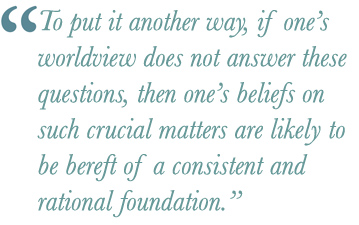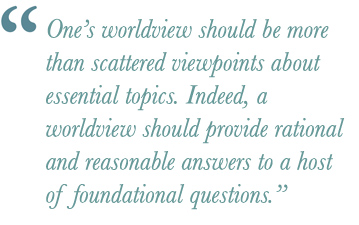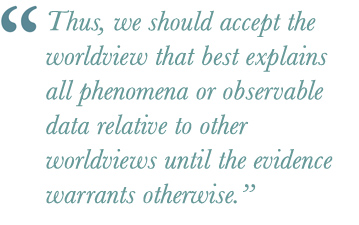By David P. Diaz, Ed.D.
What do we know about worldviews? For starters, everybody has one. “The question is not whether one holds a worldview, but whether one’s worldview is complete or incomplete, rational or irrational, true or false, precise or fuzzy” (Diaz 2020, 201). So, if everyone has a worldview, why can so few people readily explain their own?
What is a Worldview?
A worldview can be expressed as a set of propositions1 that we believe to be true about the world. The core propositions of a worldview form a lens of sorts through which we interpret the world around us. James W. Sire (2020, 11) explains it this way:
A worldview is a commitment, a fundamental orientation of the heart, that can be expressed in a story or in a set of presuppositions (assumptions which may be true, partially true or entirely false) that we hold (consciously or subconsciously, consistently or inconsistently) about the basic constitution of reality, and that provides the foundation on which we live and move and have our being.
A worldview provides explanations for fundamental questions about the universe. Consider the following questions:
- Why is there something rather than nothing?
- What caused the universe?
- What is truth, and how are we to understand it?
- What can cause a rational mind?
- Is there life after death?
- Is the brain equal to the mind?
- Do humans possess free will?
- Do humans possess authentic purpose, or are we purposeless and insignificant in the universe?
One’s worldview should provide rational answers, not only to these questions but also to many more. In other words, if one’s worldview does not answer these questions, one’s beliefs on such crucial matters will likely be bereft of a consistent, rational foundation.
A worldview can and does change over time. We will likely modify many of our views during our lives based on our experiences with family members, friends, and the community at large. Our worldview will most likely further change based on the input we gain from formal and informal education.
Many people cannot identify their worldview because they have not taken the time to evaluate the relative strengths and weaknesses of different views. Such an absence of inquiry may also explain why so many people are unsure of the truth about the universe’s realities.
For the purposes of this paper, there are five major philosophical and religious worldviews: monotheism, polytheism, pantheism, panentheism, and philosophical naturalism.2 Most of these general worldviews can be further subdivided into smaller and more discrete views (e.g., Secular humanism, deism, Christian theism, Islamic monotheism, etc.). Although this paper will not evaluate each worldview, it will provide criteria on which to base such an assessment.
How to Evaluate a Worldview
One’s worldview should be more than scattered viewpoints about essential topics. Indeed, a worldview should provide rational and reasonable answers to a host of foundational questions. A worldview cannot be a hodgepodge of rhetoric, but it must satisfy our need to know the truth about the profound questions that we humans have asked ourselves since the beginning. Below are a few criteria (adapted from Groothuis 2011, 52–60) that can be used to evaluate one’s worldview.
An intellectually sound worldview is:
Rational and reasonable
A sound worldview must provide a rational explanation for the key features of the universe (e.g., the origin of the universe, the apparent distinction between body and mind, the origin and existence of human life, and others). In short, a sound worldview will supply good reasons for believing the things we do.
Internally logically consistent
Logical consistency is a necessary condition of truth. Each worldview will have several essential components.3 These components must be in accord. They cannot be contradictory; otherwise, we must accept that the worldview (or at least certain essential elements) cannot be true. A worldview may be true if it is logically consistent but is necessarily false if its essential concepts are logically inconsistent. Therefore, the central tenets of a worldview must not be self-contradictory.
Coherent
This criterion is very similar to the previous one but emphasizes the interrelatedness of the core concepts. If a worldview’s core propositions are coherent (i.e., meaningfully interconnected), the worldview is more likely to be true than if its core propositions are incoherent (i.e., not so interconnected). For example, in Christian theism, God’s being and behavior are meaningfully related to the human condition. God is an intellectual and personal being who loves his creation (i.e., humans). Since humans are created in God’s image and likeness, it is not surprising that humans exist as intellectual and personal beings. Moreover, it is not surprising that God has created humans to enjoy loving relationships with their Creator. Each of these core concepts of Christian theism demonstrates the interrelatedness between God and creation.
Factually adequate
The more facts and evidence that can be brought together to support the core propositions, the more likely the worldview is to be true. Conversely, the less evidence that supports a worldview, the less likely it is to be true.
Existentially viable
A worldview must be livable in the real world. To be viable, the core tenets of a worldview should not encourage philosophical hypocrisy.4
The Value of Having a Worldview
According to Sire (2020, 11), “to discover one’s own worldview… is a significant step toward self-awareness, self-knowledge, and self-understanding.” What makes a worldview (or set of opinions) helpful to those who seek the truth is that it provides rational explanations for the fundamental questions of interest. In the end, the benefit of aligning one’s beliefs with a particular worldview is to have systematic, rational explanations or answers to the most critical questions that we humans have asked ourselves since we began to contemplate such matters.
One does not need to have a well-thought-out worldview to develop reasonable explanations for some essential questions. Nevertheless, by examining the major worldviews and understanding how they differ, one should start to see which worldview best explains more of the universe’s essential realities. Eventually, one should seek to align oneself, at least provisionally, with the worldview that best meets the criteria above.
Conclusion
In summary, for a worldview to be considered ‘rational,’ its arguments should: (1) Reasonably and sufficiently explain what they ought to explain and (2) be logically consistent with applicable norms of rationality and with accepted laws or principles of science (i.e., gravity, thermodynamics, etc.). It should (3) be internally coherent, (4) factually adequate, (5) livable in the real world, and (6) intellectually and culturally beneficial.
When a worldview can show itself to have solid, rational answers to the universe’s fundamental questions, and when other significant worldviews falter, it is rational and reasonable to hold such a worldview. Thus, we should accept the worldview that best explains more phenomena or observable data relative to other worldviews until the evidence warrants otherwise.
About the Author
David P. Diaz, Ed.D. is an author, retired college professor, and publisher of the Things I Believe Project. His writings have spanned the gamut from peer-reviewed technical articles to his memoir, which won the 2006 American Book Award. Dr. Diaz holds a Bachelor’s and Master of Science degrees from California Polytechnic State University, a Master of Arts in Philosophical Apologetics from Houston Christian University, and a Doctor of Education specializing in Computing and Information Technology from Nova Southeastern University.
References
Diaz, David P. Genesis Labyrinth: Investigating Alternatives in the First Eleven Chapters of Genesis. S.l., CA: Xulon Press, 2020.
Groothuis, Douglas R. Christian Apologetics: a Comprehensive Case for Biblical Faith. Downers Grove, IL: IVP Academic, 2011.
Sire, James W. The Universe next Door: a Basic Worldview Catalog. Downers Grove, IL: IVP Academic, an imprint of InterVarsity Press, 2020.
Footnotes
- A proposition is the meaning of a statement that expresses something that can be either true or false: “My grass is green” is a proposition about the true color of my grass. Nevertheless, propositions about the color of my grass, or the weather, or what kind of sandwich I ate last Thursday are not items of grave concern. On the other hand, the propositions “God exists” or “Humans have free will” are universally important. Most worldviews will provide answers to these questions.
- Philosophical naturalism is a materialistic/naturalistic philosophy that asserts that nothing that is supernatural or transcendent to the space-time universe exists. In other words, the natural world is the whole of reality. Philosophical naturalism should not be confused with methodological naturalism. Unlike methodological naturalism, which chooses not to look for nor consider supernatural causes in the study of the physical world, philosophical naturalism is a position that presupposes (assumes) that all reality is a physical reality. To see my evaluation of materialistic naturalism, see my article: God v. Matter as the Cause of the Universe Part 1, http://thingsibelieveproject.net/god-v-matter-as-the-cause-of-the-universe-part-1/.
- By “essential,” I mean that these components are necessary to the structure of a worldview. As Douglas Groothuis (2011, 53) noted, “The ideas of karma and reincarnation are essential and constitutive elements of Hinduism… Internal consistency of all the essential elements of a worldview is a necessary test for every worldview.”
- For example, those who advocate moral principles that do not reflect their underlying commitments and who do so in order to mislead or manipulate others are committing philosophical hypocrisy.




